Physical Address
304 North Cardinal St.
Dorchester Center, MA 02124
Physical Address
304 North Cardinal St.
Dorchester Center, MA 02124
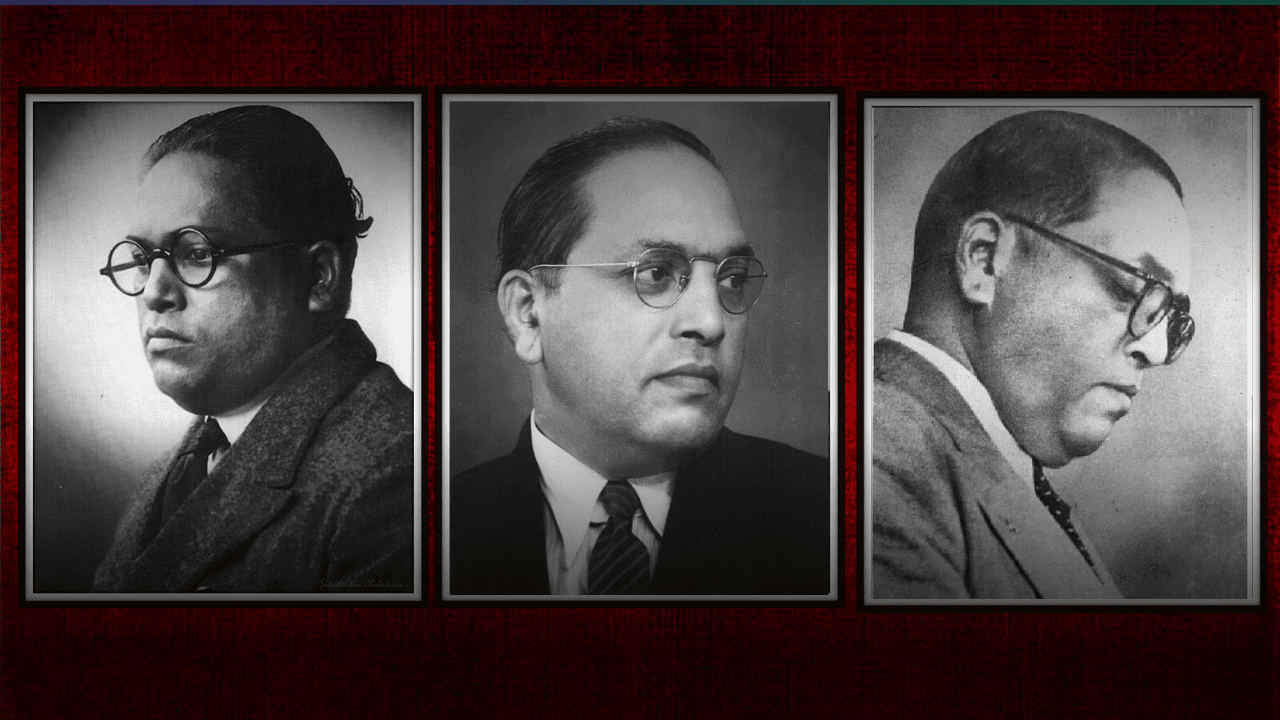
Dr B. R. Ambedkar
Bhimrao Ramji Ambedkar, popularly known as Baba Saheb Ambedkar, was born on April 14, 1891, in Mhow, Central Provinces, British India. He was a Prominent Jurist, Social Reformer and the Chief Architect of the Indian Constitution. The struggles against social discrimination marked his life journey, his determination to education and his relentless pursuit of justice for marginalized communities. Ambedkar belonged to the untouchable Mahar caste. Like many untouchables in India, the moment Dr. Ambedkar was born in pre-independent India, he faced caste-based discrimination and segregation starting at a very early age. Despite these challenges, his determination to overcome societal barriers led him to pursue and finish his basic education. He obtained degrees from the University of Bombay, and Columbia University in the United States. After realizing the power and the London School of Economics. His academic achievements set the stage for his future role as a key figure in Indian politics.
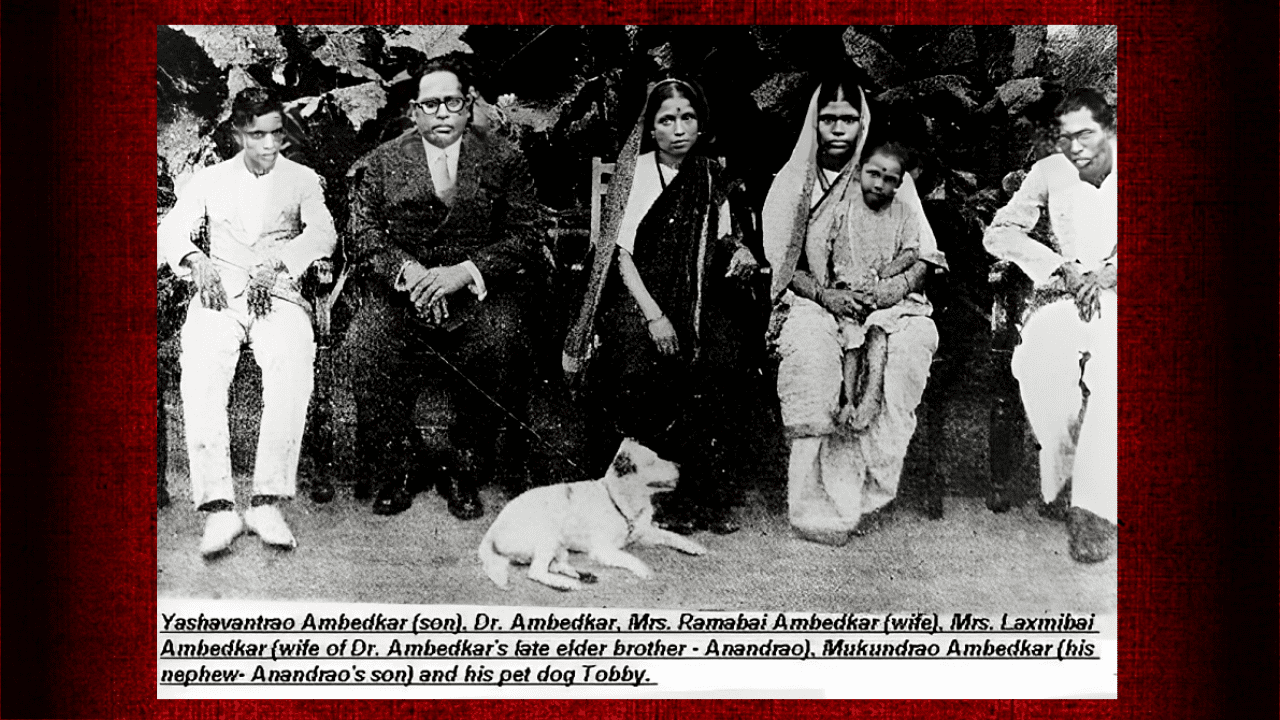
Babasaheb Ambedkar with his family members at Rajgruha, his residence was at the Hindu colony of Dadar in Bombay. From left – Yashwant (son), Babasaheb Ambedkar, Smt. Ramabai (wife), Smt. Laxmibai (wife of his elder brother, Anandrao), Mukund (nephew) and Dr. Ambedkar’s dog, Toby. Picture taken in February 1934

Dr Babasaheb Ambedkar married Dr Sharada Kabir at his residence, Hardings Avenue, New Delhi on 15th April 1948. Before the marriage, she was the doctor attending Dr. Ambedkar during his illness in Bombay.
Returning to India, Ambedkar emerged as a passionate advocate for social reform. In 1924, he founded the Bahishkrit Hitakarini Sabha an organization dedicated to the welfare of the depressed classes. His tireless efforts were directed towards eradicating the deeply entrenched caste system and untouchability. Through various initiatives and speeches, he worked towards creating awareness about the social injustices faced by marginalized communities.
Ambedkar’s influence extended into the political sphere, where he played a pivotal role in shaping the destiny of independent India. Appointed as the chairman of the Drafting Committee, he led the framing of the Indian Constitution. His profound understanding of justice, equality, and liberty was reflected in the foundational principles of the Constitution. This period marked a crucial juncture where Ambedkar’s legal, and political understanding and commitment to humanity, and social justice converged. Which began to make an indelible mark on the nation’s governance.
In the post-independence era, Ambedkar assumed key positions, notably serving as the country’s first Law Minister. In this capacity, he formulated and championed laws that aimed to safeguard the rights of the marginalized. The Hindu Code Bill, one of his ambitious initiatives, sought to reform Hindu personal and scriptural laws, challenging societal evils, norms and unjust practices. Which advocated for greater gender, social and human equality.
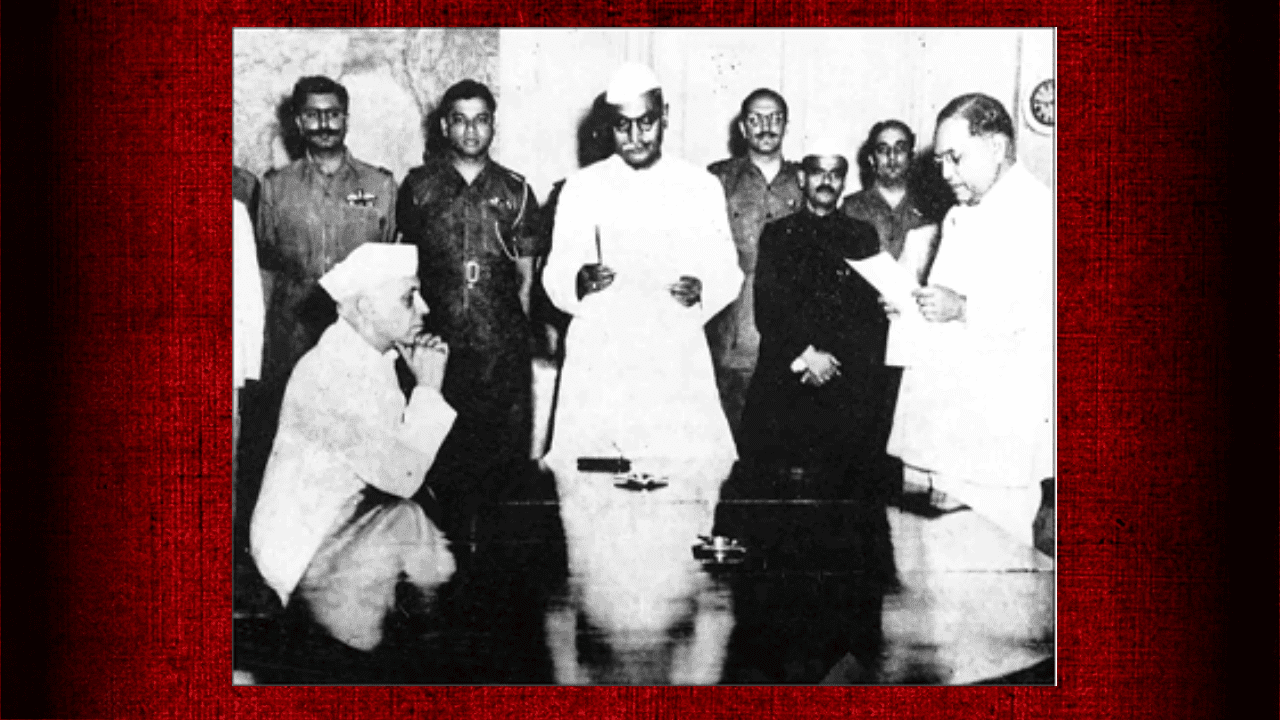
Sworn in as India’s first Law and Justice Minister.
Ambedkar’s commitment to social justice was profoundly expressed in his conversion to Buddhism in 1956. This significant act was a symbolic elimination and rejection of the oppressive caste system. The mass conversion event, known as the Dhamma Chakra Pravartan, drew the attention of hundreds of thousands of Dalits across the country. By adopting Buddhism, Ambedkar provided a new pathway of liberation and identification to the marginalized. Which aimed to emphasize the principles of equality, dignity, and freedom from caste-based discrimination.

Dr Ambedkar with Mrs Savita Ambedkar during the Deeksha ceremony at Nagpur.
Ambedkar impact on modern India remains immeasurable. Celebrated as the Father of the Indian Constitution, his visionary leadership and commitment to justice endure through annual celebrations on Ambedkar Jayanti. His writings, such as Annihilation of Caste and The Problem of the Rupee: Its Origin and Its Solution, remain influential in shaping perspectives on social issues and economic policies.
Tragically, Dr. B. R. Ambedkar passed away on December 6, 1956. However, his legacy continues as a driving force behind social justice movements and efforts to create a more egalitarian and inclusive society. Ambedkar’s life serves as a testament to the transformative power of education, unwavering perseverance, and an unyielding commitment to the principles of equality and justice. His enduring legacy continues to inspire generations to strive for a more equitable, egalitarian and equal society. Ambedkar life story serves as an inspiration and a beacon of hope for millions facing discrimination and inequality. The institutions and initiatives established in his name, such as the Dr. B. R. Ambedkar Open University, contribute to the dissemination of education and empowerment among marginalized sections of society.
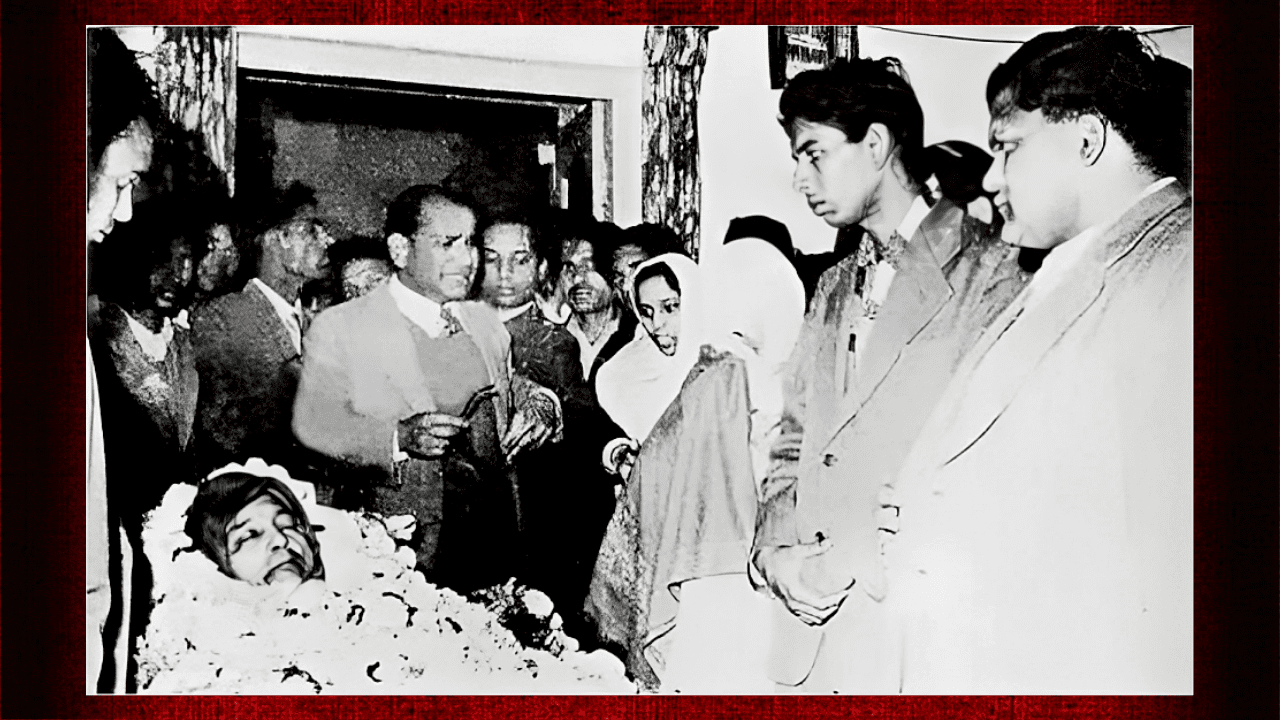
6 December 1956: Mourners at 26 Alipur Road, Dr Ambedkar’s Delhi residence, pay their final respects.
Dr. B. R. Ambedkar, a prolific writer and intellectual luminary, left an indelible mark with a collection of influential books delving into socio-economic and political issues. Here is a list of some notable writings and books:
Dr. Ambedkar’s writings have not only served as a blueprint for academic discourses but have also significantly influenced social and political movements in post-independent India. Two of his milestone, well-researched writings, “The Problem of the Rupee” and “The Annihilation of Caste,” continue to be widely read and discussed, reflecting the enduring relevance of his ideas on the Indian economy and social paradigms. The Education Department of the Government of Maharashtra and the Ministry of Social Justice continue to publish and disseminate Ambedkar’s works to ensure his legacy endures and his ideas reach a wider audience.
Dr B. R. Ambedkar, a distinguished social reformer, jurist, and the chief architect of the Indian Constitution held profound perspectives on women’s rights and their emancipation.
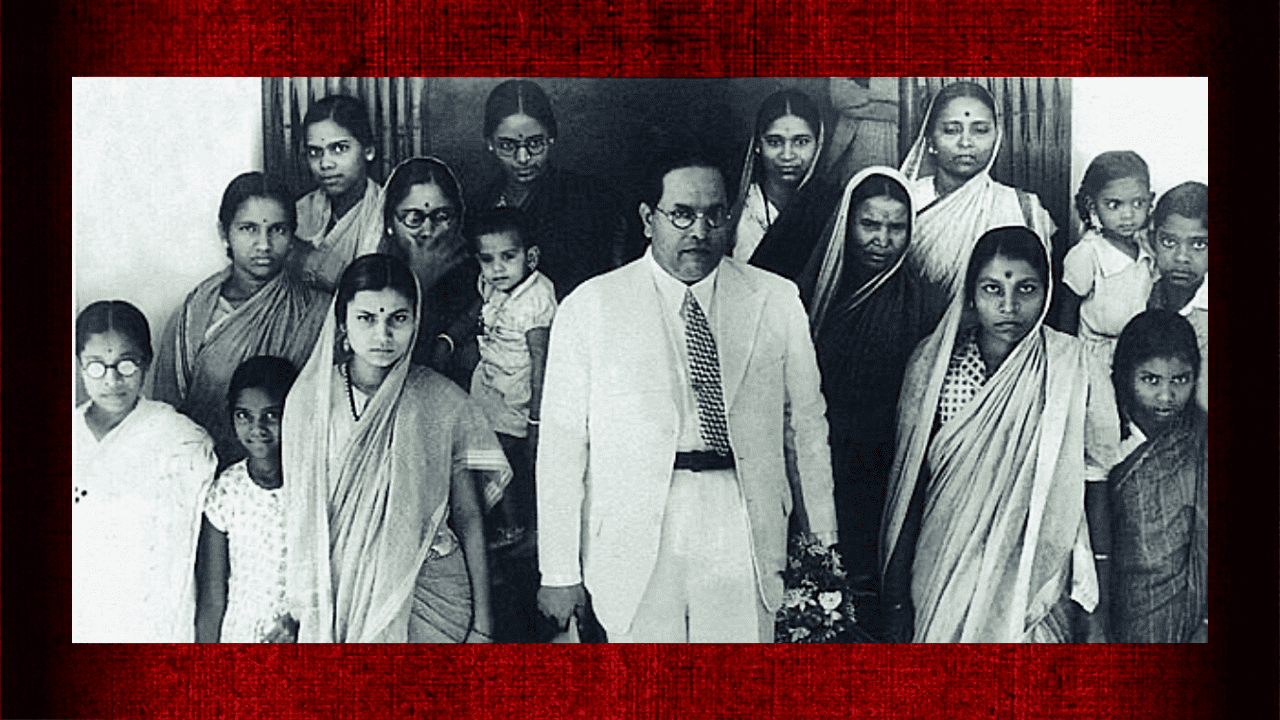
Dr B.R. Ambedkar with the women candidates of the Scheduled Castes Federation in 1942.
Equality for Women: Ambedkar ardently championed gender equality, asserting that women should enjoy the same rights and opportunities as men. He emphasized that gender should not dictate one’s social or economic standing, considering the struggle for women’s rights as integral to the broader fight for social and economic justice.
Education for Women: Recognizing the transformative power of education, Ambedkar extended this principle to women, stressing the need for their education to uplift and empower them. Education, in his view, was a crucial tool for dismantling societal barriers and challenging entrenched norms.
Women and Social Reform: A fervent advocate of social reform, Ambedkar sought to challenge regressive customs and practices that oppressed women. He censured discriminatory practices prevalent in Hindu society, including child marriage, dowry, and the degraded status of widows. his efforts aimed at eradicating such practices through legal and social reforms.
Role of Women in Politics: Ambedkar firmly believed in the active participation of women in political processes. He argued that political rights were vital for women’s empowerment and that their involvement in decision-making was crucial for overall societal development. He advocated for the significance of women having a voice and decision-making space in forming policies that directly affect their livelihood.
Women’s Economic Independence: Economic independence was a central theme in Ambedkar’s vision for women’s empowerment. He asserted that economic self-sufficiency would provide women with autonomy, enabling them to break free from social and economic constraints. Ambedkar advocated for opportunities for women to participate in various economic activities.
Marriage and Family Life: Critiquing prevailing norms related to marriage and family life that subjugated women, Ambedkar advocated for inter-caste marriages as a means to dismantle this subjugation of women and caste-based discrimination. He argued that a woman’s choice in marriage should be based on her consent and personal preferences rather than societal expectations.
Legal Safeguards for Women: As the principal architect of the Indian Constitution, Ambedkar played a pivotal role in incorporating provisions for women’s rights and safeguards. He was instrumental in ensuring constitutional guarantees of equality and fundamental rights for women. The Constitution of India recognizes the principle of gender equality and prohibits discrimination based on gender.
Women’s Social and Political Organizations: Supporting the formation of women’s organizations, Ambedkar encouraged women’s active involvement in social and political gatherings and movements. He recognized the collective strength of women coming together to address common issues and fight for their rights.
While Ambedkar’s thoughts on women’s issues were progressive for his time, it’s crucial to acknowledge that societal attitudes and challenges related to gender equality remained. His enduring legacy continues to inspire ongoing efforts to achieve genuine gender equality and justice in India and beyond.
Dr. B. R. Ambedkar played a pivotal role in the drafting of the Constitution of India. As the Chairman of the Drafting Committee, he made significant contributions that shaped the foundational document of independent India. Here are some key aspects of Ambedkar’s contribution to the drafting of the Indian Constitution:

Drafting committee of Constituent Assembly of India.
Dr. B. R. Ambedkar’s visionary leadership, legal acumen, and commitment to social justice were instrumental in shaping the Constitution of India. His contributions continue to be celebrated, and he is often referred to as the “Father of the Indian Constitution.”
In conclusion, the life of Dr. B. R. Ambedkar stands as a remarkable saga marked by unwavering determination, intellectual brilliance, and a steadfast commitment to social and economic justice, as well as the advocacy of human rights. His journey encompassed the formidable challenge of confronting the discriminatory caste system, and his pivotal role in shaping India’s legal and constitutional framework has left an indelible mark on the nation’s history. Beyond the realm of legal and political reforms, Ambedkar’s enduring legacy resonates in the hearts of millions of Indian citizens. They continue to find inspiration in his tireless dedication to the noble cause of social equality, justice, and fraternity.
Ambedkar emerged as a passionate advocate for social reform. In 1924, he founded the Bahishkrit Hitakarini Sabha an organization dedicated to the welfare of the depressed classes. His tireless efforts were directed towards eradicating the deeply entrenched caste system and untouchability. Through various initiatives and speeches, he worked towards creating awareness about the social injustices faced by marginalized communities.
Dr. B. R. Ambedkar passed away on December 6, 1956. However, his legacy continues as a driving force behind social justice movements and efforts to create a more egalitarian and inclusive society. Ambedkar’s life serves as a testament to the transformative power of education, unwavering perseverance, and an unyielding commitment to the principles of equality and justice. His enduring legacy continues to inspire generations to strive for a more equitable, egalitarian and equal society. Ambedkar life story serves as an inspiration and a beacon of hope for millions facing discrimination and inequality. The institutions and initiatives established in his name, such as the Dr. B. R. Ambedkar Open University, contribute to the dissemination of education and empowerment among marginalized sections of society.
B.R. Ambedkar, a key architect of the Indian Constitution, dedicated his life to combating social discrimination. He drafted a constitution that enshrined principles of equality, inclusion, and affirmative action, implementing reservation policies to uplift Scheduled Castes, Scheduled Tribes, and Other Backward Classes. Ambedkar vehemently opposed untouchability, leading campaigns for its eradication, and eventually renounced Hinduism, embracing Buddhism to symbolize his rejection of caste-based discrimination. Through educational initiatives and activism, he tirelessly advocated for the rights of marginalized communities, leaving a lasting impact on India’s pursuit of social justice and equality.